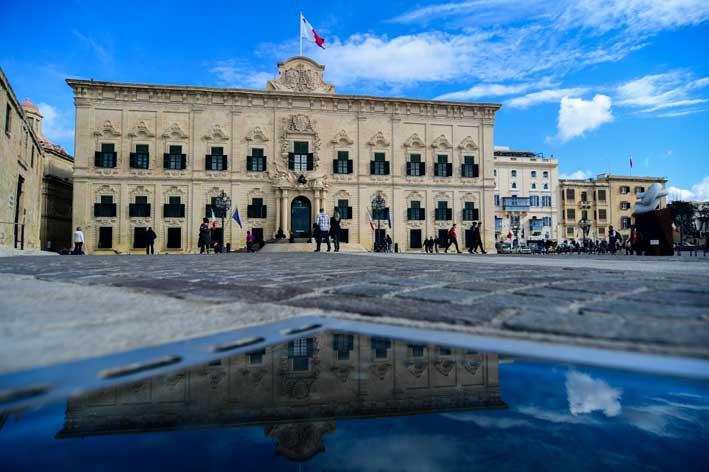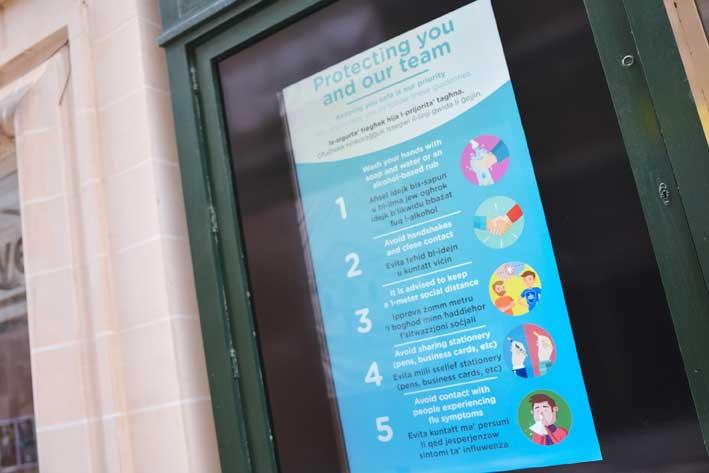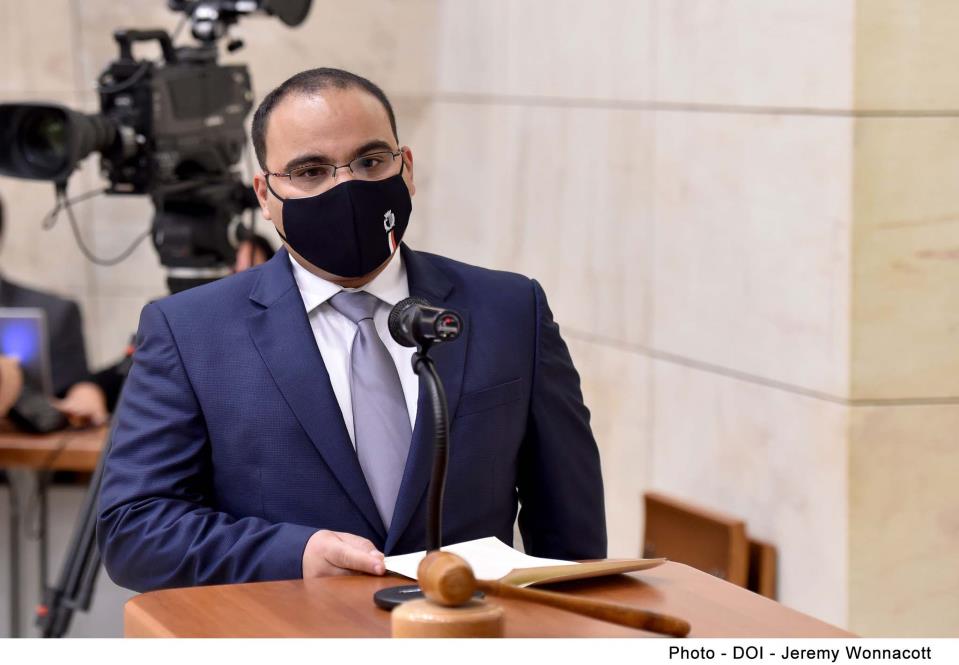Clyde Caruana will remain Prime Minister Robert Abela's Head of Secretariat despite being co-opted to Parliament, he told The Malta Independent on Sunday in an interview.
Caruana is one of two new PL MPs who were co-opted to Parliament this past week, after former Prime Minister Joseph Muscat and Etienne Grech resigned as MPs. Miriam Dalli was the other.
He denied that occupying such a post while also being an MP is a conflict of interest. Asked whether he would feel the need to hold back from criticising the government, given the position he holds, he said that constructive criticism is part of his job.
Caruana, an economist, was previously the head of JobsPlus. Back in January 2019, Caruana was reported to have said that Malta would need another 13,000 foreigners that year to maintain its economic growth. The issue of Malta’s growing population was, at the time, a point of contention between Malta’s political parties, with the PN arguing that the government was basing Malta’s economic growth on a strategy of population increase.
Caruana was asked whether Malta will be as reliant on foreign workers come March or even November next year given the Covid-19 situation.
“As a result of the reduction in economic activity, we have seen that the absolute number of foreign workers has gone down when compared to pre-Covid-19.”
“In terms of whether we would need any foreign workers, the answer right now is, of course, no, and actually they are going back to their home countries,” he said.
Caruana said that employers, once economic growth starts, will try to increase the productivity of their workers. “Once that is exhausted, it is only thereafter that, if needs be, they will start to employ additional employees. If the talent is not here, then they will again resort to hiring foreign workers.”
Speculation has also been rife that this was Edward Scicluna’s last budget as finance minister, and that Caruana might replace him. Asked about this however, Caruana neither confirmed nor denied it. “Cabinet reshuffles are the prerogative of the Prime Minister,” he said.

As an MP, what areas would you like to focus on?
My area of expertise has always been in the area of economics and the labour market. There is where I can give my 100% output.
Having a background in economics it’s a very interesting time for you as the budget was just revealed. There has been some criticism that the budget did not look far enough into the future. What's your opinion?
I beg to differ for the simple reason that there is one particular measure that speaks volumes.
This government has the credentials when it comes to economic growth. Since 2013, bar this year due to the Covid-19 pandemic, the average growth rate for the country was around 6% in real terms.
The measure I am referring to is the fact that government is going to, over a period of seven to eight years, allocate the sum of around €450 million for the upgrading, refurbishing and creation of new industrial zones, where we can have enough space to accommodate new economic activity.
I don't think there has been such a large monetary commitment before, to create all that space for new economic activity. If we are going to allocate those funds it would mean that projects will start to flow as time passes.
You're still serving as Prime Minister Robert Abela's Head of Secretariat correct?
Yes.
Will you be stepping down from that role now that you are an MP or will you be staying on?
No, I will still hold my position.
Do you see any potential conflict of interest?
No. In the previous administration there was someone (Alex Muscat) who was an MP and was also the Prime Minister's Deputy Chief of Staff.
There were some issues raised in the past by The Commissioner for Standards in Public Life regarding MPs being able to speak out openly if they are employed with the government.
Only if, for example, you are a member or chairperson of a board. In fact, prior to being sworn in as an MP, I had resigned my position as chairperson of JobsPlus.

But you're the Head of Secretariat for the Prime Minister...
From here I do not have direct influence on government's policy. I work in the Office of the Prime Minister, so my position is purely political, rather than as a public servant. My position here is that of a person of trust. I am politically appointed rather than holding office as a chairperson of an entity or any particular civil servant post.
So if it came to a point where you need to criticise the government you wouldn't feel the need to hold back because of your position?
To be quite honest, constructive criticism is part of my daily job. For the simple reason that, if we want the government to remain strong and keep in touch with the general public, that is something that I have to do on a daily basis. Among my colleagues I am well known for not being a person who says yes to everything, but rather I tend to give my input. I have always been like that and will remain like that.

There has been a lot of talk about Malta's war chest to combat Covid-19. There is concern as to how much support the government can continue to provide to the economy in the current situation. Given the latest batch of measures was just announced, are we now reaching the point where, if no real solution is found by March Malta will be in trouble?
No. We still have significant room where we can manoeuvre. We can still exercise leverage if we need to introduce new measures.
The reason is simple, the debt-to-GDP ratio - that is the size of the government's debt in relation to the country's GDP. This year we will close with a figure of around 54% and next year it will reach 59%.
Where does this leave us? If we had to compare our burden relative to that of Italy, France, the UK and Spain - those countries are all north of 110%. So of course the amount of debt and the burden these countries will carry will be significant and they will have no other option except to increase taxation or cut expenditure. It might not happen now, but they will need to do it in the foreseeable future as it is very difficult to carry that burden and it will suffocate public finances.
With respect to Malta, the burden is still low relative to GDP. When the PL was elected to government in 2013, the debt to GDP figure was around 70%, which was even higher than what we are going to have by the end of next year. Simply put, even by just comparing the ratios, we still have significant room to manoeuvre, both by domestic standards and even relative to other Eurozone countries.
The wage supplement in itself takes up a substantial amount of funds...
But it would be more negative for the economy if the government had to pull the plug now, rather than stop the haemorrhage and keep the patient alive until the patient can get better. If we pull the plug now we risk losing the patient. We are quite confident that the patient can survive and as such it makes economic sense to keep injecting the funds, given that it is possible, until there is a vaccine and the economy can start to recover.

One of the contributors to the Maltese economy was the IIP scheme. The EU Commission has now put the scheme under the microscope. If the Commission were to clamp down on the incoming IIP replacement scheme and say Malta cannot implement it, what economic impact would this have?
Firstly, the government will try to persuade the Commission by putting forward all the relevant arguments to support our position in favour of the new programme. The old IIP programme has been closed and there is now going to be a new one with different rules and terms.
Secondly, it is true that the IIP proceeds used to contribute to the public purse. But having said that, the public purse did not rely on those funds. So while the contribution was positive, as it added additional funds, under no circumstances did public finances depend solely on the scheme, nor are they at some kind of risk if those proceeds no longer come into the public coffers.
So while it is nice to have additional revenue, under no circumstances will there be a meltdown of public finances if that revenue is jeopardized.
The EY Attractiveness Survey showed that Malta's attractiveness to foreign investors has declined - in 2019, 77% said Malta was attractive, in 2020 62% said Malta is attractive - and this was partly attributed to Malta's damaged international reputation. It also showed that companies were concerned about the Moneyval report. What is your opinion on this and how do you think the government should work to tackle this issue?
This is something one would expect. That is why over the past nine months the government has been busy addressing the Venice Commission's concerns as well as those of GRECO and Moneyval. This work has still not concluded and we still have work to do with respect to Moneyval. Eventually the outcome will be made public next year.
I am confident that at the end of the day, the international community and even the local business community will see all the developments made in a positive way, as a substantial amount of legislation has been produced. A lot of work has been done, there is still more to do and I am sure that the government will continue to do whatever it takes so that, one year from now, that percentage would hopefully rise.

The Moneyval report and the damage to the country’s reputation were caused by events under the previous administration, under Joseph Muscat. There were corruption allegations, scandals etc. How do you think the government should act now to avoid such situations in the future?
The Prime Minister made it quite clear, since January, that the government will do its best to right all the wrongs and to strengthen the institutions. The amount of hours the Prime Minister has dedicated to ensure that the required reforms make it to Parliament was commendable. I am sure that the Prime Minister is committed to ensuring that the country's reputation among EU member states is what it has to be.
Do you personally believe Malta will pass the Moneyval test?
We will do whatever it takes to ensure that we will pass.
When you were head of JobsPlus, the country's economic situation was different and the government at the time focused on the requirement of having a certain number of foreign workers employed in the country each year. Do you think that it was right to take the economy down that path or should a different path have been taken and secondly, given the Covid-19 situation, will things change? Will Malta be as reliant on foreign workers come March or even November next year?
In terms of requiring more foreign workers, as a result of the reduction in economic activity, this year we have seen that the absolute number of foreign workers has gone down when compared to pre-Covid-19. In March 2020 there were 71,224 foreign nationals (including EU citizens) living in Malta, which dropped to 69,383 in September.
One would expect this given that the economy is going to register a decline of around 7%. It stands to reason that the demand for labour will not be what it was.
As a result, employers are not renewing permits for foreign workers, hence they are returning to their countries of origin.
Tying this in to the first part of your question, foreign workers were and are required in the absence of Maltese workers. Now that the economy is no longer growing because of Covid-19, then of course employers are adjusting.
I recall the reports being published last March, that unemployment will hit 20,000 or more. Those figures did not materialise for the obvious reason that employers would do their utmost to retain native employees, as native employees are here to stay.
On the other hand, if there is no longer a demand for the services rendered by a non-EU worker, the employer has every right not to renew the work permit.
Looking at unemployment abroad, it is increasing at a gradual pace, but here in Malta it increased but is now going down. Looking at the increase in unemployment among Maltese citizens, the figure is now less than 1,000.
In terms of whether we would need any foreign workers, the answer right now is, of course, no, and actually they are going back to their home countries.
In terms of forecasting, employers first, once economic growth will start, will try to increase the productivity of their workers. Once that is exhausted, it is only thereafter that if needs be they will start to employ additional people. If the talent is not here, then they will again resort to hiring foreign workers.
There's a lot of speculation that this was Edward Scicluna's last budget as Finance Minister and that you might replace him. Can you confirm this? Have you heard anything to that effect?
Cabinet reshuffles are the prerogative of the Prime Minister.
If you were to be given a ministry, what ministry would you like to have?
Cabinet reshuffles are the prerogative of the Prime Minister.